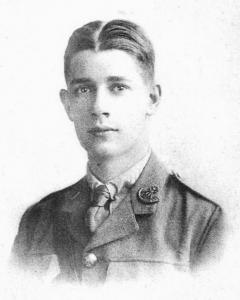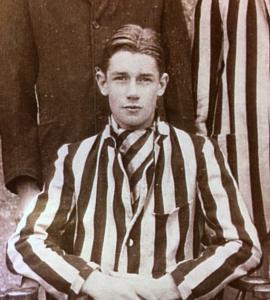
|

|
| 2nd Lieutenant Walter Francis WOOLF | |
|
1st Battalion King’s Shropshire Light Infantry attached to C Company, 7th (Service) Battalion Date of birth: 1st November 1897 Date of death: 27th March 1918 Killed in action aged 20 Buried at Wailly Orchard Cemetery Plot II Row B Grave 4 |

|
| Walter Francis Woolf was born at Woking in Surrey on the 1st of November 1897 the youngest son of Major Herbert Greenough Woolf, South Staffordshire Regiment and barrister-at-law, and Blanche Du Terrence (nee Bogle) Woolf of “Sernley” near Woking. He was christened at St Peter's Church, Woking on the 1st of December 1897. He was educated at Lancing College where he was in Seconds House from September 1912 to July 1915. He went on to the Royal Military College Sandhurst from where he was commissioned as a 2nd Lieutenant in the King's Own Shropshire Light Infantry on the 19th of July 1916. He embarked for France on the 23rd of September 1916. On the 13th of November 1916 the 7th Battalion King’s Shropshire Light Infantry was detailed to attack the village of Serre as part of the Battle of the Ancre. The village had been held by the Germans despite it being an objective of the opening day of the Battle of the Somme on the 1st of July. The British artillery began firing on the German positions on the 11th of November and continued until the early morning of the 13th. On the night of the 12th/13th of November the battalion moved up to the front line where they deployed C and D Companies in the front trench with A and B Companies in the second line. At 5am the battalion moved out of the trenches and lined up in artillery formation in preparation for the attack. At 5.45am the Shopshires moved across no man's land, through thick mud and fog and in pitch darkness. Although the German defences were penetrated in most places, Serre itself did not fall as the ground gained could not be held. This was put down to the appalling ground conditions coupled with the inability of the troops to keep in touch in the darkness. The Shopshires had suffered casualties of ten officers and two hundred and fourteen other ranks killed ,wounded or missing during the fighting. Walter Woolf was among the wounded. He was evacuated to the rear where he was taken to the Russian Hospital. On the 15th of November 1916 he was loaded on board the Hospital Ship "Jan Breydd" at Boulogne and landed at Dover later that day. A Medical Board sat at Caxton Hall in London on the 20th of November 1916 to report on his injuries: - "The board finds that this officer was struck by a shrapnel bullet 4" above the patella on the outer external aspect of the right thigh. The bullet emerged on the inner aspect of the limb at a slightly higher level. Both entrance and exit wounds as now healing each being the size of 1 /-. The officer is much run down and anaemic." When he recovered he was posted to Bush Camp at Pembroke Dock where a Medical Board sat on the 23rd of April 1917 and concluded: - "The wounds are now healed and he is fit for general service." He rejoined his battalion at the front in May 1917. On the 21st of March 1918 the Germans launched their spring offensive and made huge gains on a wide front. That day the 7th Battalion King’s Shropshire Light Infantry was ordered to move from their support line into reserve trenches to the west of Henin. They were under considerable shelling from both high explosive and gas shells and lost around 80 officers and men during the day. The following day they were forced to withdraw as the units either side of them had fallen back. The trenches they had been allocated were only two feet deep and the men immediately set about improving them in anticipation of further German attacks. At 4.30 am on the 24th the expected attack came which was driven back. The next two days were relatively quiet and the Shopshires deployed two companies in the front line and two in support. On the 27th of March the enemy subjected the first line trench to a "violent" bombardment during which the trench was reduced to chaos. 2nd Lieutenant David Leonard Price and Walter Woolf were both killed during the shelling. His father received the following telegram dated the 8th of April 1918: - "Deeply regret 2 Lieut W.F. Woolf Kings Shropshire Light Infantry killed in action March twenty seventh. The Army Council express sympathy." His father applied for his medals in November 1921. He is commemorated on the Woking Town war memorial and on the memorial at the Royal Military College Sandhurst. |
|
 | |
| Seconds House |
Back